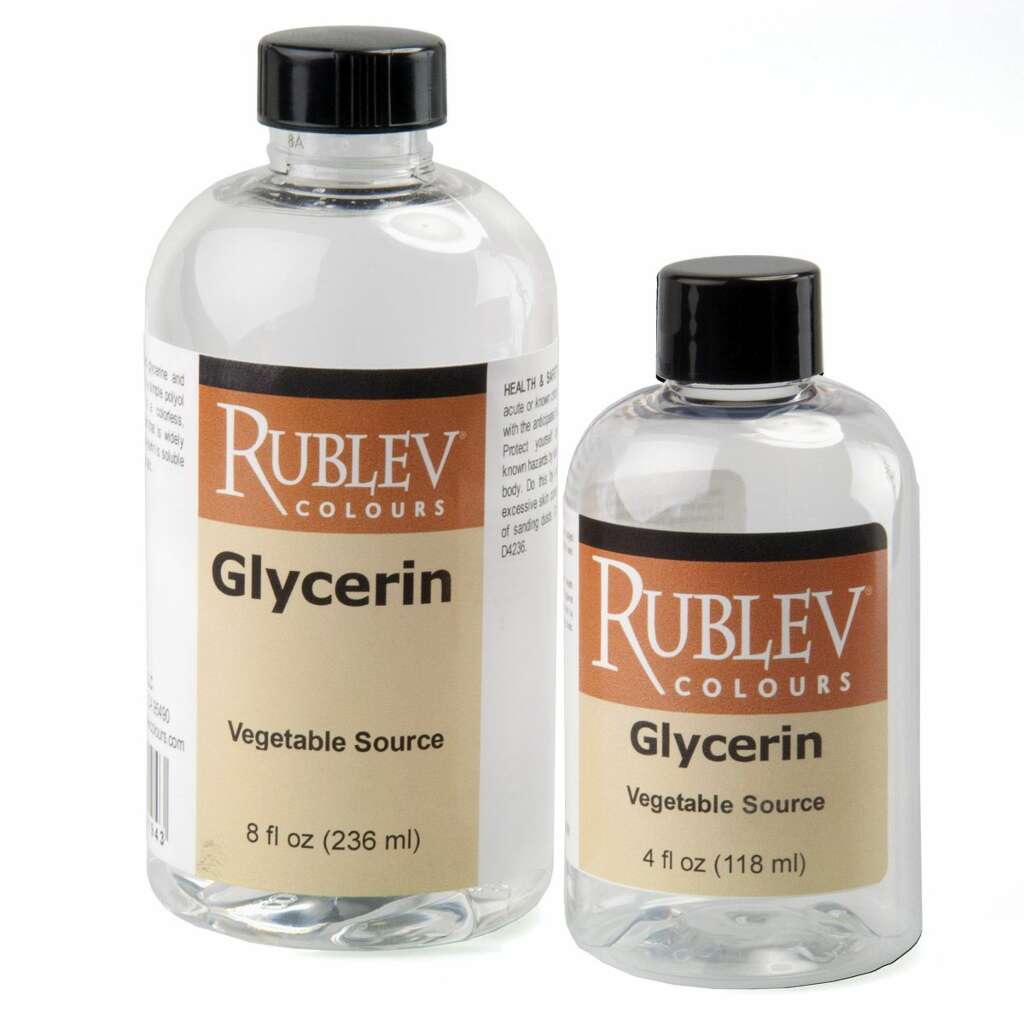Glycerin
Glycerin (also called glycerol) is a plasticizer and humectant that is added to glues and starches to make them more flexible and prevent cracking. Makes watercolor wetter and last longer on the palette.
Glycerin is chiefly used as a moistening and plasticizing agent, particularly for aqueous mediums such as egg white, gelatin, and gum. Add it to glues and starches to make them more flexible and prevent cracking. Makes watercolor wetter and lasts longer on the palette.
Glycerin (also spelled glycerine and also called glycerol) is a colorless, transparent, and odorless sweet syrupy liquid. Glycerin is a hygroscopic, trihydroxy alcohol (HOCH2CHOHCH2OH) that occurs combined as glycerides and is formed by the alcoholic fermentation of sugars, that is usually obtained as a by-product in the manufacture of soap or fatty acids by the saponification of fats or as a synthetic product from propylene or allyl alcohol, and that is used chiefly as a solvent and plasticizer, as a moistening agent, emollient, and lubricant, as an emulsifying agent, and as a starting material in the manufacture of many derivatives.
Origin and History
The word is derived from the Greek word glykys meaning sweet. In 1779, Swedish scientist K. W. Scheele discovered glycerin in a hydrolysate of olive oil. Initially, glycerin was used in the manufacture of glue and cork, and over time applications extended to use in dye auxiliaries for textiles and ink. In 1867, A. B. Nobel manufactured dynamite from glycerin, a development that proved a major turning point in the expansion of applications for glycerin.
Source
Glycerin is prevalent in higher plants, seaweed, and in animals. In humans, glycerin is accumulated subcutaneously or in muscle tissue in the form of lipids. Substances for which fatty acids are ester-bonded to all three hydroxyl groups in the glycerin structure are known as lipids or oils and fats. There are two types of glycerin: natural glycerin derived from oils and fats from such, sources as coconuts and oil palms, and synthetic glycerin derived from petroleum. In the manufacture of natural glycerin, normally crude glycerin is produced by first refining and condensing an aqueous solution (sweet water) obtained from hydrolysis of oils and fats, then further distilling and refining the solution until arriving at the finished product. At present, because of the need to reuse resources, natural glycerin is the predominant type manufactured worldwide.
Our glycerin is derived from a natural vegetable source, oil palms in Malaysia, and is 99.74% pure.
Use
One important thing to know about glycerin is that it is susceptible to oxidation into aldehydes and ketones. Once the glycerin decomposition reaches a significant level, the material will turn yellow. This can be delayed by keeping the solution temperature low. Glycerin can be heated at 38–49 °C (100–120 °F) to keep it fluid enough to use, without increasing oxidation severely. In our experience, the grade and source of glycerin make a big difference in this degradation process. Because it is made from various animal and plant sources, the concentration and type of trace impurities are dependent on the source. Vegetable-based glycerin contains less nitrogen, which tends to delay the discoloration onset.
When using a less pure grade of glycerin a yellow discoloration occurs almost immediately (within 24 hours) if the temperature exceeds ~50–55 °C (~122–131 °F). It is worth noting that increasing temperature improves the wettability and dispersion of pigments in glycerin/water mixtures. In using better grades of vegetable-based glycerin no precautions to minimize excess heat have been required. To illustrate this point we subjugated four samples of glycerin to rapid thermal aging until there was a noticeable difference in their color. It took roughly three weeks at 105 °C to produce noticeable yellowing.
| Information | |
| Source: | Oil Palm Elaeis guineensis |
| Synonyms: | Glycerine, Glycerol, 1,2,3-Propanetriol, Propane-1,2,3-triol |
| Chemical Name: | Trihydroxy alcohol |
| Chemical Formula: | CH2OH·CHOH·CH2OH (C3H8O3) |
| CAS No.: | 56-81-5 |
| Typical Analysis | |
| Appearance: | Clear |
| Assay, %: | 99.74% |
| Water, %: | <0.3% |
| Color (Alpha): | 6 |
| Refractive Index: | 1.470–1.475 |
| Specific Gravity: | 1.2615 @ 25 °C |
| Density: | 1.261 g/cm3 @ 25 °C |
| Boiling Point: | 290 °C (554 °F) |
Health and Safety
This product fully complies with the monograph requirements for USP and FCC glycerin.
Storage
Glycerin absorbs moisture, so keep tightly closed in a cool, dry place away from direct light.
| SKU | 500-GCRN |
|---|---|
| Brand | Rublev Colours |
| Vendor | Rublev Colours |
| Processing Time | Usually ships the next business day. |


